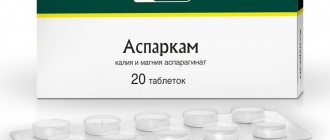Write a review
Reviews: 0
Manufacturers: Gedeon Richter (Hungary)
Active ingredients
- Potassium aspartate
- Magnesium aspartate
Disease class
- Previous myocardial infarction
- Premature ventricular depolarization
- Heart failure, unspecified
- Cardiac glycosides and drugs with similar effects
- Magnesium deficiency
- Insufficiency of other specified nutrients
- Hypokalemia
Clinical and pharmacological group
- Not indicated. See instructions
Pharmacological action
- Antiarrhythmic
- Replenishes potassium deficiency
- Replenishes magnesium deficiency
Pharmacological group
- Antiarrhythmic drugs
- Macro- and microelements
How does Panangin work?
Panangin for intravenous administration
Panangin is one of the few drugs that contain potassium and magnesium ions in an active, readily available form. The combination of two microelements in one preparation is justified by the fact that potassium deficiency in the body is often accompanied by magnesium deficiency, so it is almost always necessary to correct them simultaneously.
Potassium and magnesium play a large role in the functioning of the body. Potassium maintains the membrane potential of neurons, myocytes and other excitable cells of myocardial tissue. A decrease in the amount of potassium in the cells can lead to a violation of myocardial contractility, a violation of the frequency, rhythm and sequence of excitation and contraction of the heart muscle.
Magnesium plays a vital role in the functioning of the body and is an integral part of more than 300 enzyme reactions. Thus, with its participation, muscle contraction (including the heart muscle), transmission of nerve impulses, and protein and DNA synthesis occur.
This microelement exerts its effect on the heart muscle in various ways: it makes the heart rhythm more stable, improves nutrition of the heart muscle, as it dilates the coronary vessels, ensuring normal blood flow, improves blood flow through the vessels, which reduces the risk of thrombosis, and reduces the accumulation of cholesterol in the arteries.
It has been proven that regular intake of Potassium and Magnesium helps reduce the risk of heart attack by 2 times and the risk of stroke by 40%.
Thanks to this composition, Panangin strengthens the heart muscle, improves its function, helps normalize metabolic processes in the myocardium, prevents early aging and wear of the myocardium, prevents atherosclerosis, hypertension, arrhythmia, coronary heart disease and metabolic changes in the myocardium.
Solution for infusion Panangin (Panangin)
Instructions for medical use of the drug
Description of pharmacological action
A preparation containing potassium aspartate and magnesium aspartate. It is assumed that aspartate is a carrier of potassium and magnesium ions and promotes their penetration into the intracellular space. Entering cells, aspartate is included in metabolic processes (metabolism). Magnesium ions contribute to the therapeutic effect of the drug.
Indications for use
Solution - chronic heart diseases (heart failure, condition after myocardial infarction); - heart rhythm disturbances, primarily ventricular arrhythmias (as an additional remedy); - therapy with cardiac glycosides (as an additional agent). Tablets As an additional remedy: - chronic heart diseases (heart failure, condition after myocardial infarction); - heart rhythm disturbances (primarily ventricular arrhythmias); - treatment with cardiac glycosides; — replacement therapy for a lack of magnesium/potassium in food.
Release form
Solution for intravenous administration; ampoule 10 ml contour plastic packaging (pallets) 5 cardboard pack 1; Solution for intravenous administration; ampoule 10 ml contour plastic packaging (pallets) 5 cardboard pack 1; Solution for intravenous administration; ampoule 10 ml cardboard box (box) 10; Solution for intravenous administration; ampoule 10 ml contour plastic packaging (pallets) 5 cardboard box (box) 1;
Pharmacodynamics
Panangin is a source of important electrolytes: potassium and magnesium ions. One of the most important functions of potassium ions is to maintain the membrane potential of neurons, myocytes and excitable structures of myocardial tissue. An imbalance between intracellular and extracellular potassium leads to a decrease in cardiac contractility, arrhythmia, tachycardia and increased toxicity of digitalis. Magnesium is an important cofactor in more than 300 enzyme reactions, including energy metabolism and the synthesis of proteins and nucleic acids. In addition, magnesium plays an important role in the functioning of the heart: it reduces contraction tension and heart rate, leading to a decrease in myocardial oxygen demand. A decrease in the contractility of smooth muscle myocytes of arterioles leads to vasodilation, incl. and coronary vessels, and to increased coronary blood flow. Magnesium has an anti-ischemic effect on myocardial tissue. The combination of potassium and magnesium ions in one preparation is based on the fact that potassium deficiency in the body is often accompanied by magnesium deficiency and simultaneous correction of the levels of both ions is required; further, with simultaneous correction of the levels of these electrolytes, an additive effect is observed (low levels of potassium and/or magnesium have a proarrhythmogenic effect), in addition, potassium and magnesium reduce the toxicity of cardiac glycosides without affecting the positive inotropic effect of the latter.
Pharmacokinetics
Absorption is high. Excreted by the kidneys.
Use during pregnancy
There are no data on the harmful effects of the drug during pregnancy and breastfeeding.
Contraindications for use
- hypersensitivity to the drug; - acute and chronic renal failure; - Addison's disease; — AV block II and III degrees; - cardiogenic shock (BP - hyperkalemia; - hypermagnesemia. With caution - AV block of the first degree.
Side effects
With rapid intravenous administration, symptoms of hyperkalemia/hypermagnesemia may develop.
Directions for use and doses
IV drip, in the form of a slow drip infusion containing 10–20 ml. Panangina. To prepare a solution for intravenous administration, the contents of 1–2 amps. dissolve in 50–100 ml of 5% glucose solution. If necessary, administration can be repeated after 4–6 hours. Panangin can be used in combination therapy.
Overdose
Symptoms: hyperkalemia, hypermagnesemia. Treatment: discontinuation of the drug, symptomatic therapy (iv administration of 100 mg/min calcium chloride), if necessary, dialysis.
Interactions with other drugs
When prescribed simultaneously with potassium-sparing diuretics or ACE inhibitors, hyperkalemia may develop.
Special instructions for use
Particular caution should be exercised in the presence of a disease accompanied by hyperkalemia; It is recommended to monitor blood ion levels. Does not affect the ability to drive a car or engage in activities that require increased concentration and speed of psychomotor reactions. Additionally for the solution: with rapid administration, skin hyperemia may develop.
Storage conditions
At a temperature of 15–30 °C.
Best before date
36 months
ATX classification:
A Digestive tract and metabolism
A12 Mineral supplements
A12C Other mineral supplements
A12CX Preparations of other mineral substances
Who is Panagin recommended for?
Panangin. Pills
Panangin is recommended for medicinal purposes:
- For cardiac arrhythmia (irregular heart rhythm) caused by electrolyte disturbances, mainly due to potassium deficiency in the blood
- For heart rhythm disturbances caused by intoxication with digitalis products
- For atrial rhythm disturbances
- For ventricular rhythm disturbances
- For coronary insufficiency
- For arterial hypertension
For disorders of myocardial metabolism, the cause of which is impaired blood circulation through the blood vessels of the myocardium and a decrease in the concentration of potassium in the blood as a result of taking diuretics. Panangin is recommended for all healthy people over the age of 45 for the purpose of nutrition and strengthening the heart and preventing cardiovascular pathologies.
To whom is Panagin contraindicated?
It is not recommended to prescribe Panangin in cases of renal dysfunction, oliguria, anuria, Addison's disease, heart block I, II and III degrees, cardiogenic shock, increased concentrations of potassium and magnesium in the blood serum, hypersensitivity to the components of the drug, myasthenia gravis, hemolysis, phenylketonuria, acute metabolic acidosis, dehydration.
Prescribing the drug to children and adolescents under 18 years of age is prohibited. Persons with impaired renal function should take the drug with caution. Since there is a relatively large list of contraindications, you should always consult a doctor before using the drug.
Overdose
Cases of overdose with Panangin have not been described. In case of overdose, the development of hyperkalemia (excess potassium in the blood) and hypermagnesemia (excess magnesium in the blood) is likely. Hyperkalemia is manifested by increased fatigue, muscle weakness, sensitivity disorder, confusion, and heart rhythm disturbances. The development of hypermagnesemia is indicated by a decrease in neuromuscular excitability, nausea, vomiting, lethargy, and a decrease in blood pressure. If the above symptoms appear, you should stop taking the drug and consult a doctor.
Similar drugs:
- Magne B6 Oral tablets
- Magnesium plus B6 (MAGNESIUM PLUS B6) Oral tablets
- Magne B6 forte Oral tablets
- Asparcam Solution for infusion
- Magvit (MAGVIT) Capsule
- Magne B6 Oral solution
- Magnerot Oral tablets
- Magnesium-diasporal 300 Granules for the preparation of solution for oral administration
- Potassium aspartate and magnesium aspartate Solution for infusion
- Asparcam Oral tablets
** The Drug Directory is intended for informational purposes only. For more complete information, please refer to the manufacturer's instructions. Do not self-medicate; Before starting to use the drug Panangin, you should consult a doctor. EUROLAB is not responsible for the consequences caused by the use of information posted on the portal. Any information on the site does not replace medical advice and cannot serve as a guarantee of the positive effect of the drug.
Are you interested in the drug Panangin? Do you want to know more detailed information or do you need a doctor's examination? Or do you need an inspection? You can make an appointment with a doctor - the Euro lab is always at your service! The best doctors will examine you, advise you, provide the necessary assistance and make a diagnosis. You can also call a doctor at home . Euro lab clinic is open for you around the clock.
** Attention! The information presented in this medication guide is intended for medical professionals and should not be used as a basis for self-medication. The description of the drug Panangin is provided for informational purposes and is not intended for prescribing treatment without the participation of a doctor. Patients need to consult a specialist!
If you are interested in any other drugs and medications, their descriptions and instructions for use, information about the composition and form of release, indications for use and side effects, methods of use, prices and reviews of drugs, or you have any other questions and suggestions - write to us, we will definitely try to help you.
What side effects does Panangin cause?
Due to its high quality and unique action, medical workers and patients who have completed the course of the drug express positive reviews about Panangin and note its good tolerability. In rare cases, there are complaints of nausea, vomiting, discomfort and burning in the pancreas. When taking the drug in large doses over a long period of time, hyperkalemia and hypermagnesemia may develop.





